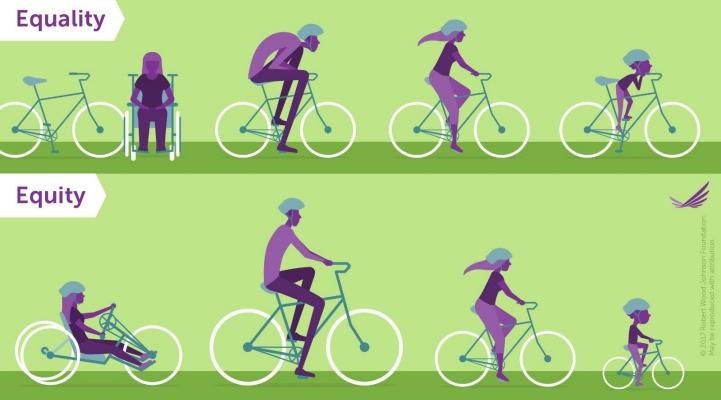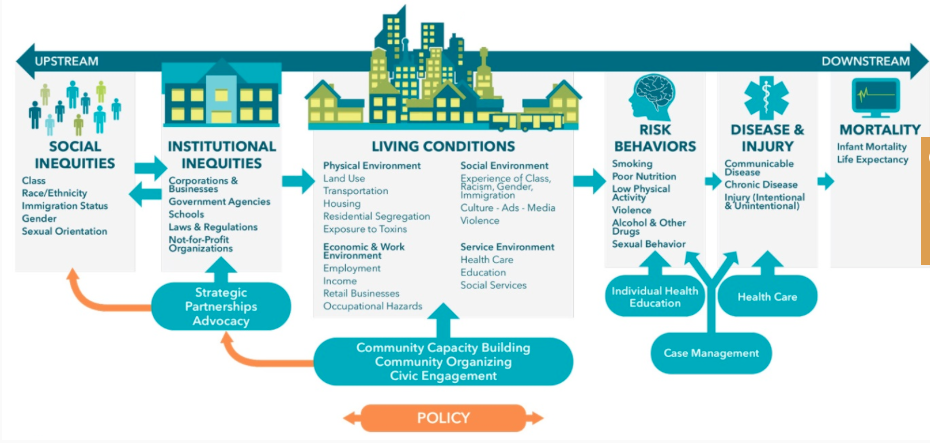Isabelle Nathanson, Outreach and Communications Fellow

Hi everyone! I’m the new Outreach and Communications Fellow here at CCHI, and amidst my first 6 weeks here I’ve noticed that the buzzword “health equity” is central to the work that CCHI and its partners do to assure Coloradans get fair, quality, affordable access to health care. In fact, health equity just so happens to be the focus of CCHI’s Consumer Voices for Change conference that’s coming up on September 20th. If you are interested in health care and the work we do or in becoming an advocate yourself, this brief “Health Equity 101” blog will serve as a perfect way to dip your toes into the water of our work, and become interested in learning more!
So what is health equity, really? Well, it’s complicated.
But here’s where to start: The Robert Wood Johnson Foundation says “Health equity means that everyone has a fair and just opportunity to be healthier. This requires removing obstacles to health such as poverty, discrimination, and their consequences”. But in order to understand what RWJF is talking about, an understanding of how social, economic, political, and institutional systems interact to create barriers to being healthy, getting access to care, and receiving quality, affordable care is key.
For example, in the US, health outcomes have been shown to vary by many measures, including “where we live, how much money we make, or how we are treated”. This is due to institutionalized barriers to quality housing, education, healthy food, a built environment that supports health (like safe sidewalks and easy access to parks and outdoor spaces), and a myriad of other resources that influence health outcomes over the course of people’s lives. When we think about ways to ensure everyone can lead a healthy life, we have to think about social, economic, and racial inequality as starting points, instead of only focusing on the health care people receive down the line, or whether they have health insurance or not. This approach is called the “Social Determinants of Health” perspective, which goes hand in hand with achieving health equity. Basically, the key is starting at the root of the problem, or ‘upstream’, as health advocates often say.
And guess what? We all benefit from this approach in the end, no matter our circumstances, because using this perspective saves money on health care systematically and helps communities across the country thrive.
This graphic sums it up:

So what does that mean in practice at CCHI?
At CCHI we advocate on behalf of consumers at every step of the health care system to ensure everyone in Colorado has equitable access to quality, affordable health care. We partner with organizations that work in many different areas like education, public health, children’s issues, reproductive rights, business, and more. This coalition framework fosters innovative approaches to not just getting people access to health care, but working toward addressing all of the factors that can improve their health. In addition, it will ensure Coloradans have the resources and opportunities to live healthy lives before they need to use the health care system. CCHI balances systemic, institutional-level health care reform with individual assistance of Coloradans through our consumer assistance and community outreach programs in order to truly advocate for solutions that are responsive, intersectional, nuanced, and those which will have the most impact.
I bet by now you’re thinking, “Well, that’s pretty cool. What can I do to work towards health equity?”, and we can help you there!
If you’re interested in getting into the nitty-gritty of health equity and connections between health care, economic justice, and financial stability, register for our Consumer Voices for Change conference on September 20th, where keynote speakers, panelists, and break-out sessions will focus on these concepts in depth and how to put them into practice. You can register using this link.
I can’t wait, and I hope to see you there.
